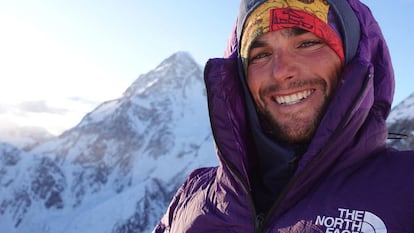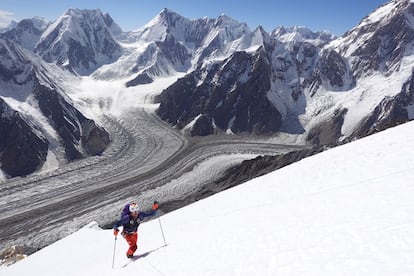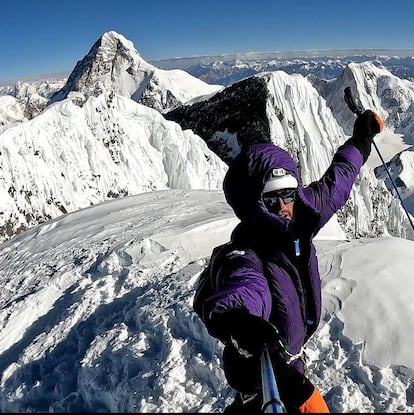Is Benjamin Védrines the world’s fastest mountaineer?
The Frenchman has halved previous time for ascending Broad Peak in the Himalayas

Hermann Buhl, the man who made the first solo ascent of Nanga Parbat (8,125 meters) in 1953, could never have imagined that he would inspire so many mountaineers, eager, like him, for lightness and speed. The French Alpinists are no exception, keen to take their lightning ascents of the Alps to the Himalayas. From Benoît Chamoux to Marc Batard, the French penchant for economy of means has always been key.
Now, French mountain guide and professional Alpinist, Benjamin Védrines has just set a mind-blowing speed record on the world’s 12th highest mountain, taking just seven hours and 28 minutes from the base camp to the summit of Broad Peak (8,047 m) in Pakistan.
In 1957, Hermann Buhl was among the four Austrian climbers who made the first ever ascent of Broad Peak to become the second man after the Sherpa Gyalzen Norbu (Makalu, 1955, and Manaslu, 1956), to achieve two first ascents on eight-thousanders. Buhl’s legendary status endures, not least because he died days later on the neighboring unclimbed Chogolisa (7,665 m).
Together with Fritz Wintersteller, Marcus Schmuck, Kurt Diemberger, Buhl experimented with the Alpine style of climbing in the Himalayas, dispensing with sherpas and bottled oxygen and though ropes were used in the most delicate sections, their avant-garde climb proved inspiring to future generations.

After opening a new route on Chamlang (7,319) with Charles Dubouloz in October 2021, Védrines announced that he would spend the winter and spring training hard with a view to breaking the Broad Peak ascent record, officially held by Poland’s Krzysztof Wielicki in 1984 at 15 hours and 40 minutes. “It was not his record that I was chasing because in reality the record was held by the Spaniard Jorge Egocheaga, who in 2006 stopped the stopwatch at 10 hours and 30 minutes,” Védrines explained on his social networks upon his return from Pakistan.
The world’s fastest mountaineer
Frenchman Rodolphe Popier, an analyst of Himalayan ascents, puts Benjamin Védrines’ achievement in perspective: “He is the fastest human being in terms of average speed of ascent of a mountain over 8,000 meters,” he explains. “I recently discovered Jorge Egocheaga’s time on Broad Peak, which put him at the top of the ranking with an average speed of 320 vertical meters per hour, but it must be said that he had to open the path alone from 7,300 meters. Given that, he would have had a similar time to Védrines, since his speed at the bottom of the mountain is very similar. The second fastest was Denis Urubko, who climbed Gasherbrum II (8,035 m) in 2001at a speed of 298 vertical meters per hour. In contrast, Védrines, with an open path to the summit, has blown all records with 450 vertical meters an hour. Incredible,” he says.

Vedrine’s record is probably due to his systematic training program adhered to for years and perfected in recent months: Védrines crossed the Mont Blanc massif on skis in 20 hours and 5 minutes, totaling 70 kilometers of travel and 7,000 vertical meters; he also completed the eastern Meije in the Écrins in less than two hours to cover 2,211 vertical meters, as well as beating one of the late Ueli Steck’s speed records on Mont Rose.
Rope but no ice axe
Besides Védrines athletic constitution, the high temperatures recorded this summer in Pakistan allowed him to wear much lighter boots and clothing than usual. The fact there was a camp at 6,600 meters explains why he left base camp with just a couple of energy bars and a liter and a half of water. Another full bottle was waiting for him at 6,600 meters at which point he rested for 45 minutes and set off for the summit without an ice axe, but with two poles, using a fixed rope in the most exposed areas.
It also helped that he knew the route – just three weeks earlier he had climbed the mountain in a more traditional fashion, but rather than walk down, he made the first ever descent of Broad Peak in a paraglider weighing less than two kilograms. “Clearly, comparing records from such different eras may not be relevant, but that’s the game,” Védrines told Montagnes Magazine. “There will be others who will climb faster than me, with lighter materials and in better conditions, and I will have to accept that. In the 80s, there was a lot of doping in the Himalayas. I, at least, don’t dope.”
In excellent shape, Védrines moved days later to the K2 base camp, located just two hours’ walk away, with the idea of setting a new speed record on the world’s second-highest mountain. It almost ended in tragedy: at 8,300 meters, overcome by fatigue, he began to lose his balance. He doesn’t even remember how his mission was aborted, only that a Mexican climber and his Sherpa gave him artificial oxygen and another Polish climber helped him to anchor himself to the fixed rope. Some Italians also helped and, once he felt safe, at 7,400 meters, he took off with his paraglider. He thinks he may have suffered the onset of cerebral edema: his blood, so rich in red blood cells, looked like blueberry jam. Before Broad Peak, Védrines had never set foot on an eight thousander.
Tu suscripción se está usando en otro dispositivo
¿Quieres añadir otro usuario a tu suscripción?
Si continúas leyendo en este dispositivo, no se podrá leer en el otro.
FlechaTu suscripción se está usando en otro dispositivo y solo puedes acceder a EL PAÍS desde un dispositivo a la vez.
Si quieres compartir tu cuenta, cambia tu suscripción a la modalidad Premium, así podrás añadir otro usuario. Cada uno accederá con su propia cuenta de email, lo que os permitirá personalizar vuestra experiencia en EL PAÍS.
¿Tienes una suscripción de empresa? Accede aquí para contratar más cuentas.
En el caso de no saber quién está usando tu cuenta, te recomendamos cambiar tu contraseña aquí.
Si decides continuar compartiendo tu cuenta, este mensaje se mostrará en tu dispositivo y en el de la otra persona que está usando tu cuenta de forma indefinida, afectando a tu experiencia de lectura. Puedes consultar aquí los términos y condiciones de la suscripción digital.









































